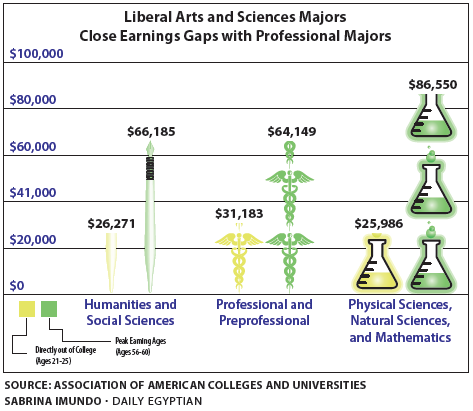Study says liberal arts degrees are still valuable

January 27, 2014
The idea of the unemployed liberal arts major may soon be going to the wayside.
The Association of American Colleges and Universities and the National Center for Higher Education Management Systems released a report Wednesday that analyzed earnings and career paths of various undergraduate majors.
The report, “How Liberal Arts and Sciences Majors Fare in Employment,” used data from the 2010 and 2011 U.S. Census Bureau’s American Community Survey.
Advertisement
It said liberal arts degrees could become more valuable than professional and pre-professional degrees in the long run.
Carrie Johnson, AACU’s associate director of marketing and media relations, said the report comes at a time when it is sometimes assumed liberal arts majors will always have a hard time finding a job.
“We thought this report was especially timely because lately, the liberal arts has been under attack by a variety of commentators and policy makers,” Johnson said. “There is that stereotype that your major will determine your success, and that’s not necessarily true.”
The report compared the earnings of a student with a liberal arts degree to earnings of a student majoring in science, mathematics, engineering, or professional or pre-professional fields such as business, agriculture or education.
At the peak earning ages of 56-60, workers who majored in the humanities or social sciences make on average about $2,000 more yearly than those who majored in professional or pre-professional fields, the report said.
The report shows that a student directly out of college between ages 21-25 majoring in humanities and social sciences earns an average of $26,271 per year whereas professional and pre-professional majors earn $31,183 per year.
However at their peak earning ages between 56-60, humanities and social sciences majors earn $66,185 per year, while professional and pre-professional majors earn $64,149 per year. Physical sciences, natural sciences and mathematics majors were the highest earners at an average of $86,550.
Advertisement*
Johnson said the report also shows liberal arts degree earners are employable. The report’s findings showed the unemployment rate for recent liberal arts degree earners is statistically in the same range as other majors.
Students in liberal arts colleges often narrowly focus on their major, Johnson said, which leads to stereotypes that a liberal arts degree will not provide jobs.
“I think people in general focus almost too much on what students’ major is in college,” Johnson said. “They would see a student with say, an English degree, and think ‘What can that person possibly do with that? Are they going to be working in a bar or are they going to be able to get a job?'”
Ravyn Shelton, a graduate student from Chicago studying communication disorders and sciences, said a liberal arts degree was inferior to the other categories.
“I wouldn’t know what type of job a liberal arts major would have,” Shelton said. “There is no specialization.”
However, Nick Black, a senior from Hop Mills, N.C. studying management, disagreed.
“I wouldn’t think getting a job for them would be any harder than for anyone else,” Black said.
Claude Saint-Cyr, a junior from Chicago studying finance, said it is hard to say liberal arts majors struggle to find jobs because the college itself is vast. He said it also depends on the individual.
“It just depends on the person and their enthusiasm and who they know,” Saint-Cyr said.
Kimberley Kemp-Leonard, the dean of the college of liberal arts, said there are many people misinformed about a liberal arts degree.
“If you look at many of the most recent studies they will show you that people that are successful often got their start in the liberal arts,” Kemp-Leonard said. “Many of our programs teach people to think critically, to solve problems and to be adaptable.”
Kemp-Leonard said many people change jobs during their careers, which is why adaptability is so important.
In the report, some of the most popular professions of liberal arts graduates were accountants, social workers, lawyers and secondary school teachers.
“Being able to solve problems, think on your feet and communicate definitely really helps you prepare for almost any job,” Kemp-Leonard said.
Johnson said AACU issued a survey April 2013 that showed 93 percent of employers agreed that a candidate’s capacity to think critically, communicate clearly and solve complex problems is more important than his or her undergraduate major.
“Then those are skills that those who major in liberal arts acquire,” Johnson said. “Liberal arts and sciences majors do close their earning gaps with professional majors.”
Despite the negative stereotypes associated with it, Johnson said students usually are not focused on the prevailing notions of a liberal arts degree when they decide on a major.
“I think that a student chooses the liberal arts education because they want a well-rounded education across the disciplines,” Johnson said. “They can be informed in a variety of topics from arts to the social sciences because in today’s highly competitive job market, it makes them more employable.”
Advertisement







